The Mummy Returns: Mahathir Mohamad And The Malaysian Elections – OpEd
It was a victory, but it could hardly count as a truly revolutionary one. Grizzled, aged but formidably stirring, Mahathir Mohamad, Malaysia’s former prime minister, is set to form government as the world’s oldest elected leader. His Pakatan Harapan coalition ventured past the 112 seat threshold required to form government, while a weary Barisan Nasional limped through with 79.
Shocks were registered some four hours after voting closed. Transport Minister Liow Tiong Lai, head of the Malaysian Chinese Association, fell to Wong Tack of PKR. Then came the caretaker health minister S. Subramaniam. The ballot box slaughter would continue for the ruling party through the night.
This election result is only surprising if one considers the seemingly immutable nature of BN’s rule, which has lasted six decades and resisted change with studied fanaticism. Prime Minister Najib Rajak had thrown everything bar the kitchen sink at this election, enacting laws to curb the reporting of “fake news” and holding the election at an inconvenient time of the week, but even those actions could not conceal the rot that had set in.
The decay was such as to give Najib international notoriety, featuring the alleged misappropriation of funds from the state investment fund 1Malaysia Development Berhad (1MDB). Mahathir, hardly a squeaky clean figure himself, took this as his cue to return to Malaysian politics, this time under the aegis of a new party, Parti Pribumi Bersatu Malaysia.
Barisan Nasional was very much a beast Mahathir understood, having lead it for 22 years. He was its stalwart and steward before retiring. As prime minister, he pursued a modernisation agenda at some cost while also poking international rivals with vigour. “Asian values” remained a favourite theme of his, fashioned to outwit advocates of greater civil liberties.
At times, it seemed that the wily politician was right. He took considerable and understandable umbrage at the efforts of such figures as former US Vice President Al Gore to insist on his ouster in the wake of student protests against his ruthless treatment of former deputy Anwar Ibrahim. “Citizens who gain democracy,” proclaimed Gore before some thousand business leaders on a visit to Malaysia in November 1998, “also gain the opportunity and the obligation to root out corruption and cronyism.”
Such statements of sanctimonious interference merely served to shore up Mahathir’s authority. “If the attempt [to oust him] had succeeded,” penned Eiichi Furukuwa in 1999, “it would have strengthened and expanded the power of the Islamic radicals and exacerbated conflicts with the Chinese community, leading to possible Kosovo-type ethnic conflict in Malaysia.”
Economically, Mahathir was a dark sheep. He refused, much to the surprise of common wisdom at the time, to accept the orthodoxy of the International Monetary Fund clique in the wake of a financial crisis that burned through various Asian economies in the late 1990s. Capital controls on global investors were put in place, a heresy that enraged such currency speculators as George Soros, deemed by the then prime minister as one of various “unscrupulous profiteers” engaged in an “unnecessary, unproductive and immoral” trade. Currency trading, argued Mahathir, “should be made illegal.” Soros preferred to think of it as unstoppable. Mahathir, it seemed, won through on that one.
As part of his political kit, Mahathir nurses a fair number of conspiracy theories that are amply consumed in certain constituencies. His address before the Organisation of the Islamic Conference summit in 2003 held in Kuala Lumpur is still held up as an exemplar of anti-Semitic outrage. “1.3 billion Muslims cannot be a defeated by a few million Jews,” he explained to the applauding delegates. “There must be a way. And we can only find a way if we stop to think, to assess our weaknesses and our strength, to plan, to strategize and then to counterattack.”
Themes of extermination and subjugation featured in an address that would have found easy room in the Protocols of the Elders of Zion. “We are actually very strong. 1.3 billion people cannot be simply wiped out. The Europeans killed six million Jews out of 12 million. But today the Jews rule this world by proxy.”
He was also its crudest of weapons when required, manipulating ethnic insensibilities and political weaknesses for reasons of political survival. His 1970 publication The Malay Dilemma advanced the cause of ethnic Malays in the face of their more productive Chinese counterparts, an assertion of ownership and blood purity that seemed, at best, anachronistic. Malaysia’s ethnic composition – Malay, Chinese and Indian – has never been the rosy one recounted in state propaganda, but Mahathir managed to place himself, if somewhat falsely, above the fray as a unifying voice tempering violent Islamic tendencies.
He always remained the foundational pugilist, banishing opponents and anointing successors in a semi-autocratic style that won him fame. His understanding of politics is such that he will even promise enemies relief and rehabilitation if required, the most notable of this being his courting of his jailed rival Anwar.
Even now the agreement Mahathir supposedly hammered out with Anwar looks shaky and unsure, sketched in the heat of political expediency. It must involve the securing of a royal pardon, then a by-election victory to enable the former deputy prime minister to assume the reins of power from his nemesis. Yet even at the age of 92, Mahathir’s political instinct is animal like and impossible to contain. The shock here was not his victory but the lack of variety and options in Malaysian politics that might count as reform. The mummy, albeit in different wrapping, has returned.

